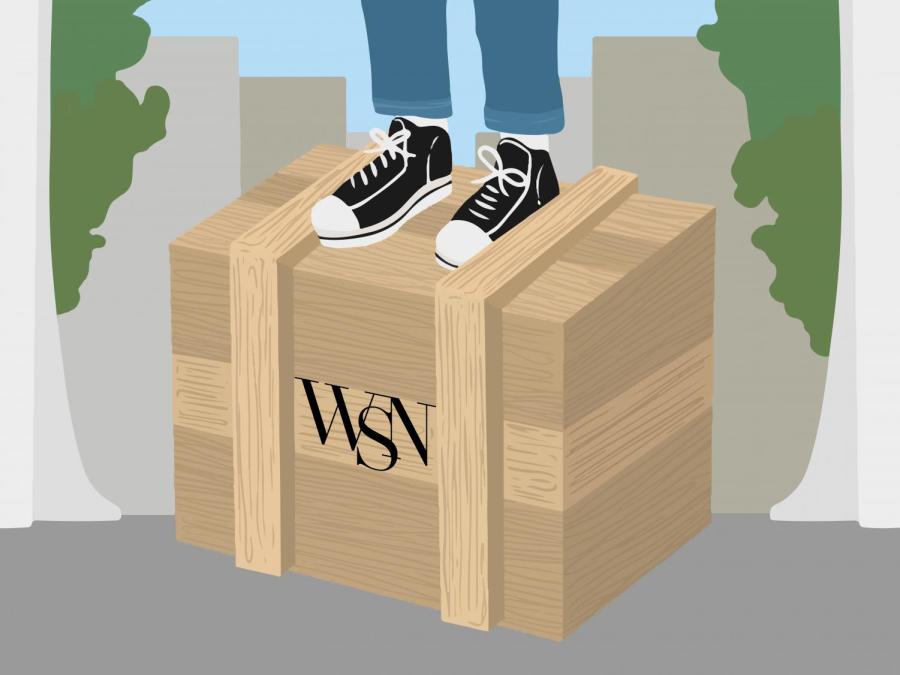The Soapbox: Italian neo-fascism, pipeline sabotage, and the European energy crisis
The Soapbox is a weekly column by WSN’s news desk analyzing major developments in world news and rounding up the stories we think are worth the read this week. Global consciousness for a global university.
The Soapbox is a weekly news column rounding up stories worth reading for a global university. (Staff Illustration by Susan Behrends Valenzuela)
September 30, 2022
In Europe, an imminent energy crisis lingers
Winter is coming, and for Europeans, an energy crisis may lead to exorbitant heating bills. Worsened by Russia’s invasion of Ukraine, the energy crisis which began in 2021 has caused electricity prices in countries like Germany to increase over tenfold since January 2020.
Pandemic recovery, increased energy demand due to extreme winters and summers, and low European gas storage all played a part in rising energy prices at the beginning of the 2021 crisis. Europe is dependent on imports for energy — they made up 58% of consumption in 2020 — and in both 2020 and 2021, Russia was the largest supplier of natural gas and petroleum oils.
When the war in Ukraine began in February, an already energy-starved Europe had to contend with the possibility of its largest energy provider decreasing supply. Energy prices rose dramatically after the start of the war, and Russia soon began cutting fossil fuel shipments.
As of late August, shipments through Nord Stream 1, Russia’s largest natural gas pipeline to Europe, had stopped indefinitely. Russia blames sanctions blocking pipeline repair and the opening of Nord Stream 2, which has not yet begun shipping gas, while European leaders accuse Russian president Vladimir Putin of deliberately throttling supply to force their hand on Ukraine. A legal battle between Gazprom, the Russian state-owned energy conglomerate, and Naftogaz, its Ukrainian equivalent, may shut down the last pipeline shipping gas from Russia to western Europe.
Germany, which depends on Russian gas, has begun burning coal in plants that were set to shut down by the end of the year. In Prague, protests over rising gas prices signal discontent with sanctions on Russia. European businesses are struggling under the weight of septupling energy bills, and produce-growers are considering shutting down greenhouses due to heating costs. Even in the United States, natural gas prices have increased by 95%, and heating prices may double this winter.
Energy subsidies passed in the United Kingdom and several European Union countries may help assuage some of the economic damage, but as winter approaches, increasing demand will only strain the already-limited supply.
“I’m afraid that the only solution this winter will be on the demand side,” Tatiana Mitrova, a research fellow at Columbia University’s Center on Global Energy Policy, told Fortune Magazine. “I think it will be quite difficult to avoid some sort of rationing and restrictions in gas demand.”
In Italy, a snap election stokes fears of rising fascism
Giorgia Meloni, leader of the far-right Brothers of Italy party, will likely become Italy’s first female prime minister, after the party’s right-wing coalition won 44% of the Sept. 25 general election. While Meloni has not yet assumed office, her position as the leader of the largest coalition means it is almost certain that she will be the next prime minister. The results of the early election bolster concerns of a continent fractured by neo-fascist populism.
Former prime minister Mario Draghi, a centrist who aided Italy’s pandemic recovery and presided over a period of stability, was forced to resign after being abandoned by the Five Star Movement — a populist party led by former Prime Minister Giuseppe Conte — in a confidence vote. Following Draghi’s resignation on July 21, Parliament was dissolved and new elections were called.
The Brothers of Italy has its roots in the Italian Social Movement, a party founded in 1946 by a former chief of staff to Mussolini. In the 1990s, Meloni joined the Italian Social Movement’s youth branches. The party changed its name to the National Alliance in 1995 in an attempt to distance itself from its fascist roots.
As an open eurosceptic, Meloni is likely to be at odds with the European Union. However, analysts say she is unlikely to pass hostile policies due to Italy’s dependence on EU funds — especially for pandemic recovery. With Sweden having recently elected a party with neo-Nazi roots, a Spanish far-right party stirring, and right-wing governments in Poland and Hungary openly disregarding EU laws, Meloni’s rise to power adds to worries about a right-wing resurgence in Europe.
“The direction of political momentum is changing — we had a wave of centrism before and during the pandemic, but now it feels like the political table is tilting back in the direction of the populists on the right,” Charles Kupchan, a European expert at the Council on Foreign Relations, told the New York Times. “And that’s a big deal.”
In the Baltic Sea, potential sabotage threatens pipelines
Potential Russian sabotage has caused Nord Streams 1 and 2 — major gas pipelines running from Russia to Germany — to leak highly flammable gas into the Baltic Sea. A pair of undersea explosions on Sept. 26 caused disruption in shipping lanes and global outcry. Russia denied all allegations that it was behind the explosions, and instead blamed the United States. NATO has attributed the leaks to sabotage.
The pipelines have been embroiled in controversy for years. Even before the Russian invasion of Ukraine, the United States opposed the construction of Nord Stream 2, citing concerns of European dependency on Russian gas, and going as far as to issue sanctions against the construction company.
Though Nord Stream 2 was finished in September 2021, it has yet to receive regulatory approval from Germany or the EU, and it has never been used. Because neither Nord Stream 1 nor Nord Stream 2 were providing gas at the time of explosion, Europe did not suffer major gas supply losses on Sept. 26, though the methane flowing from the pipeline may prove to be the largest greenhouse gas spill to date.
Despite Jens Schumann, the managing director of a German gas pipeline company, believing that the pipelines can be repaired, German officials worry that salt water may cause irreversible corrosion.
NATO’s Sept. 29 statement about the pipeline leak reaffirmed its assertion that the explosion was caused by sabotage, and issued a veiled threat against the perpetrator of the attack.
“All currently available information indicates that this is the result of deliberate, reckless, and irresponsible acts of sabotage,” the statement reads. “We, as Allies, have committed to prepare for, deter and defend against the coercive use of energy and other hybrid tactics by state and non-state actors. Any deliberate attack against Allies’ critical infrastructure would be met with a united and determined response.”
Contact Tori Morales at [email protected]




























































































































































